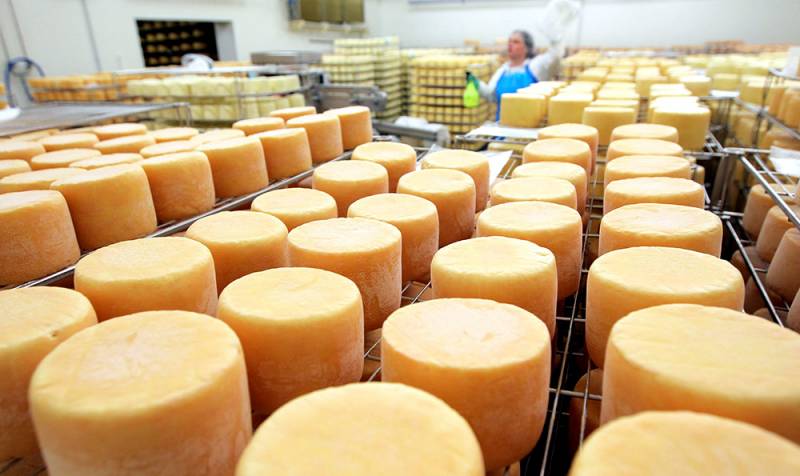Why did Russia start a trade war with Belarus?
Since February 26, 2018, the Rosselkhoznadzor has banned the supply to the Russian Federation of milk and dairy products produced in neighboring Belarus. According to the official explanation of the ban, dairy products that continue to come from Belarus do not meet safety requirements. On February 20, the Rosselkhoznadzor tightened control over the products of seven enterprises in the neighboring republic, and on February 22 included the products of six more enterprises in this list. Claims about Belarusian products due to veterinary and sanitary violations.
The ban includes milk, pasteurized, concentrated, condensed, sterilized cream, bulk milk, dry and concentrated whey, milk and whey protein concentrate.
As you know, Belarus is one of the main producers of milk and dairy products in the post-Soviet space. Dairy farming has been developing in the country for a long time and, together with agriculture, is a fundamental pillar of the Belarusian agricultural industry. Dairy plants and combines operate in a number of cities in the country. Export of dairy products accounted for a significant part of the total supply of agricultural goods to the territory of Russia. Belarus remains the main supplier of dairy products to the Russian Federation. It accounts for 77% of the total volume of the supplied product.
What could be caused by the increased attention of the Rosselkhoznadzor to Belarusian products? Indeed, until recently, milk and dairy products from Belarus were quietly imported into Russia, although it was unlikely at that time that their quality was significantly different for the better. Only from 2013 to 2016. The volume of deliveries of milk and dairy products to Russia increased from 4 million tons to 6 million tons.
In fact, neighboring and very friendly states have long been sorting out relations with each other and policy moves to food markets. Since Russia is the main market for the Belarusian manufacturer, with the help of the ban on the import of Belarusian products, one can quite effectively demonstrate who is the boss in the house.
The ban on the import of dairy products in the Rosselkhoznadzor was thought back in the fall of 2017. There are several reasons for this.
At firstThe policy of Minsk has long been displeasing to Moscow. Alexander Lukashenko is trying to maneuver between Russia and the West, but recently he has increasingly distanced himself from Moscow. From this point of view, the ban on the import of milk is a good pressure tool that will help the Belarusian authorities to think about their behavior.
Secondly, the products of some Belarusian enterprises are really far from perfect, and in addition, it competes with the growing Russian agricultural industry. After all, most of the milk consumed in Russia is already produced in our country.
ThirdlyIt is not a secret that Belarus has long been engaged in the transit of European products to Russia that are subject to Russian food sanctions. So Minsk gets a double benefit - the money comes from both European companies and Russian consumers. Moscow really does not like this situation, as it seriously reduces economic effect of sanctions for EU countries.
The ban includes milk, pasteurized, concentrated, condensed, sterilized cream, bulk milk, dry and concentrated whey, milk and whey protein concentrate.
As you know, Belarus is one of the main producers of milk and dairy products in the post-Soviet space. Dairy farming has been developing in the country for a long time and, together with agriculture, is a fundamental pillar of the Belarusian agricultural industry. Dairy plants and combines operate in a number of cities in the country. Export of dairy products accounted for a significant part of the total supply of agricultural goods to the territory of Russia. Belarus remains the main supplier of dairy products to the Russian Federation. It accounts for 77% of the total volume of the supplied product.
What could be caused by the increased attention of the Rosselkhoznadzor to Belarusian products? Indeed, until recently, milk and dairy products from Belarus were quietly imported into Russia, although it was unlikely at that time that their quality was significantly different for the better. Only from 2013 to 2016. The volume of deliveries of milk and dairy products to Russia increased from 4 million tons to 6 million tons.
In fact, neighboring and very friendly states have long been sorting out relations with each other and policy moves to food markets. Since Russia is the main market for the Belarusian manufacturer, with the help of the ban on the import of Belarusian products, one can quite effectively demonstrate who is the boss in the house.
The ban on the import of dairy products in the Rosselkhoznadzor was thought back in the fall of 2017. There are several reasons for this.
At firstThe policy of Minsk has long been displeasing to Moscow. Alexander Lukashenko is trying to maneuver between Russia and the West, but recently he has increasingly distanced himself from Moscow. From this point of view, the ban on the import of milk is a good pressure tool that will help the Belarusian authorities to think about their behavior.
Secondly, the products of some Belarusian enterprises are really far from perfect, and in addition, it competes with the growing Russian agricultural industry. After all, most of the milk consumed in Russia is already produced in our country.
ThirdlyIt is not a secret that Belarus has long been engaged in the transit of European products to Russia that are subject to Russian food sanctions. So Minsk gets a double benefit - the money comes from both European companies and Russian consumers. Moscow really does not like this situation, as it seriously reduces economic effect of sanctions for EU countries.

Information